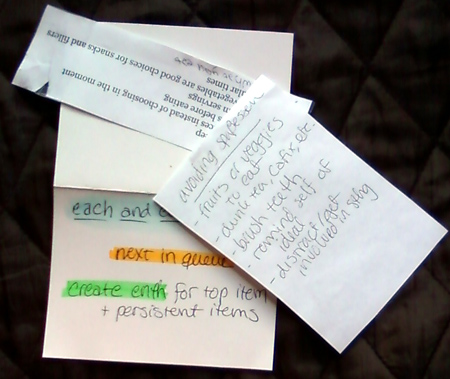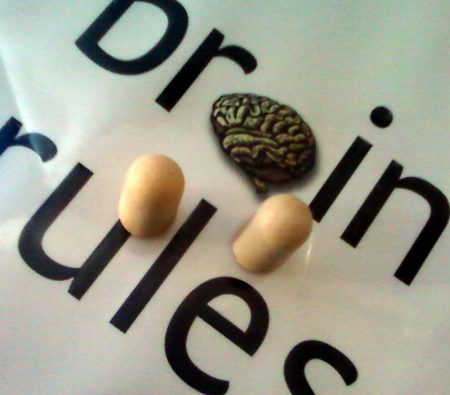
It’s one thing to maintain willpower in normal circumstances, in an environment you can control, after a lot of practice. It’s usually much more difficult to stick to your chosen path when circumstances change: travel, holidays, restaurants, vacations, celebrations, moves, new jobs, and so on. Thanksgiving through Christmas is like a parade of these kinds of issues, at least for anyone working on weight loss. Yet some people get through the holidays maintaining or reducing their weight, in the same way some people can go to restaurants full of unhealthy foods and find the good choices there. How does this happen?
The information in this post is specifically about weight loss, but these tactics work for any kind of challenge to willpower, and apply to sustaining any habit through a hard time. The tactics are 1) commit yourself, 2) get informed, 3) make a plan, 4) throw away illusions, 5) enlist help, and 6) resist attacks.
Commit Yourself
You can either let yourself go on the one hand, consuming huge quantities of food, feeling overstuffed, gaining weight, and possibly feeling unhappy about it; or you can commit to eating modestly and expending a lot of effort, avoiding a lot of foods you’ll probably really want to eat, being conspicuous, feeling much better than everyone else after the meal, and then maybe marveling at your success.
If you do want to eat a lot, probably no one will stop you–but if you’re deciding to eat healthily, you’ll need to commit yourself completely. Habit and tradition are generally too strong to be overcome without real resolve.
Get Informed
What foods will be at the event you’re going to? Which ones might be good choices for you to eat? Find out the calorie counts (or exchanges, etc.) for each one. Whatever system you use to track what you eat, apply it to the things you expect to see at the event you’re going to, so that you know for certain whether or not a sliver of pumpkin pie fits in your plans, or whether the potatoes or the cranberry sauce are a good idea. If you don’t have a system for tracking what you eat, you’ll almost certainly need one.
Make a Plan
If you expect trouble over the holidays, that’s an immediate indication that the habits you already have probably aren’t up to the challenge. So you’ll need to make specific plans for behavior–plans more advanced than a general intention to eat less. Willpower is not a vague energy that you can draw from the æther to apply to different situations by “just doing better”; it’s using mental tools to steer yourself into acting differently than you usually would.
What will you eat? How much will you eat? What will you do if the food you’re expecting to see isn’t there? What will you not eat? What will you say when someone tries to urge you to eat it, since after all, “it’s a holiday” or “it’s just this once” or “Martha made it herself” or “it doesn’t count”? What anti-hunger techniques will you use? (See “24 Ways to Stop Feeling Hungry” for some options.)
If you want better choices for food, considering making or bringing them yourself. Eating separate food from everyone else takes a little courage and makes you stand out. But it also demonstrates that you’re serious and committed.
Remember that you’ll need to plan for each event you go to, or else make rules that will keep you on the path for all events. It especially helps to have an emergency plan for unexpected events, like when someone brings cake into the office or you’re invited to dinner on short notice.
Throw Away Illusions
You may not need to hear these things, but in case you do: when you’re trying to lose weight, everything you eat “counts.” Your biology won’t care that it’s Thanksgiving. If you don’t get to eat something that looks good to you, you’re not owed any compensation. You don’t get any do-overs except that you can try again the next time an event comes up. Some people at the event may try to make you feel guilty for not eating; if they don’t have to haul the resulting fat cells around, though, they don’t get a vote.
Enlist Help
If you tell people in advance that you’re losing weight and really don’t want to gain it back over during the holidays, they have more of a chance to prepare themselves and to assist and support you. Walking in the door with your own meal in Tupperware when some one’s already gone to the trouble of making your favorite pie can cause trouble both with your relationships and your eating habits. Giving notice in advance can make it easier for others to help.
Not that everyone will necessarily want to help. Some people may feel that your work on your weight is an implied criticism of their own weight. Others may mistakenly think that trying to lose weight means that you think you “need” to lose weight to be a valuable person rather than that you’re just a valuable person who just wants to lose weight. Some people may be offended that you don’t stick to traditions or don’t eat what they’ve prepared. You’ll have to decide whether it’s more important to have their approval or to stick with your own priorities. It’s very easy to go with the approval; that’s the popular choice.
Resist Attacks
It’s very likely that someone will offer you food that doesn’t fit your plans–and maybe even try to insist. In addition, foods have a nefarious and evil way of offering themselves. Plan how you will resist these attacks and remind yourself that they are attacks when they occur (not in the sense of someone else intending to cause harm, but in the sense of posing immediate and real danger to your well-being). It sometimes helps to recognize the attraction before fighting it, for instance saying mentally “Yes, I could have some more mashed potatoes with gravy, and I would probably enjoy them. I ‘m just choosing not to.”
Specific ways to resist attacks are listed in that article on hunger I mentioned.
Holidays and special events aren’t easy to navigate. If, like me, you’re walking into the den of the beast with the intention of coming out lighter on the other side, good luck! Today I weigh 182 pounds. I’ll update this post in early January to let you know how it came out for me: I expect to have lost at least a few pounds. (Added later: want to know how it went? Read the follow-up post.)
Photo by Donna Grayson




 Hunger is a widely misunderstood feeling: we tend to think that it’s our stomachs that are mainly responsible for making us feel hungry; that hunger is a signal that something’s wrong in the body and needs to be fixed; that hunger is painful; and that hunger means the body needs food. All of these can be true in some situations, but all can also be misleading or false.
Hunger is a widely misunderstood feeling: we tend to think that it’s our stomachs that are mainly responsible for making us feel hungry; that hunger is a signal that something’s wrong in the body and needs to be fixed; that hunger is painful; and that hunger means the body needs food. All of these can be true in some situations, but all can also be misleading or false.
 My current reading is
My current reading is



